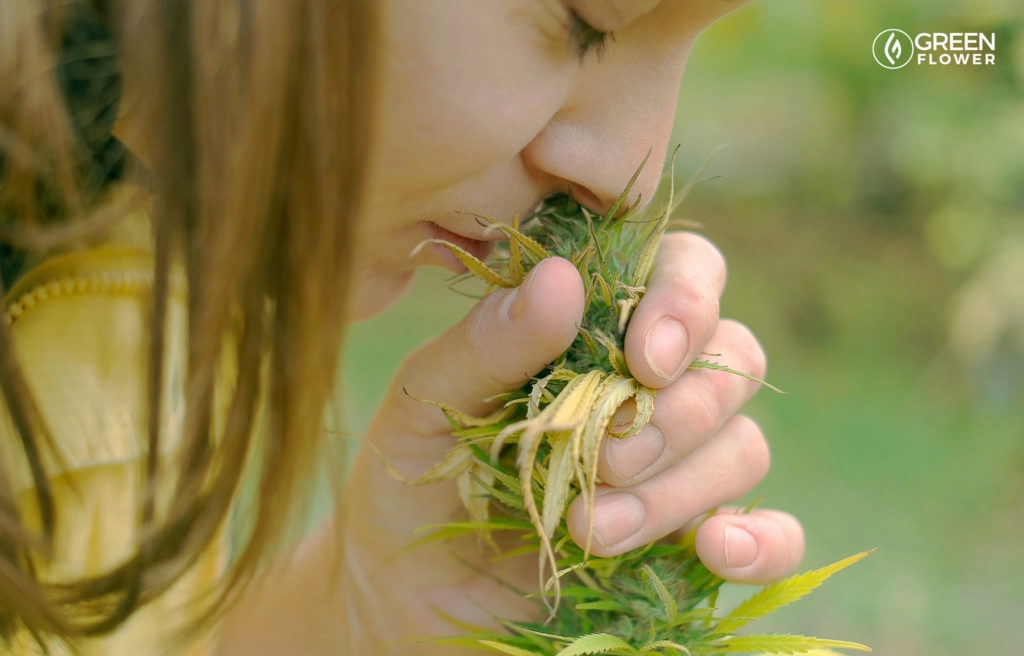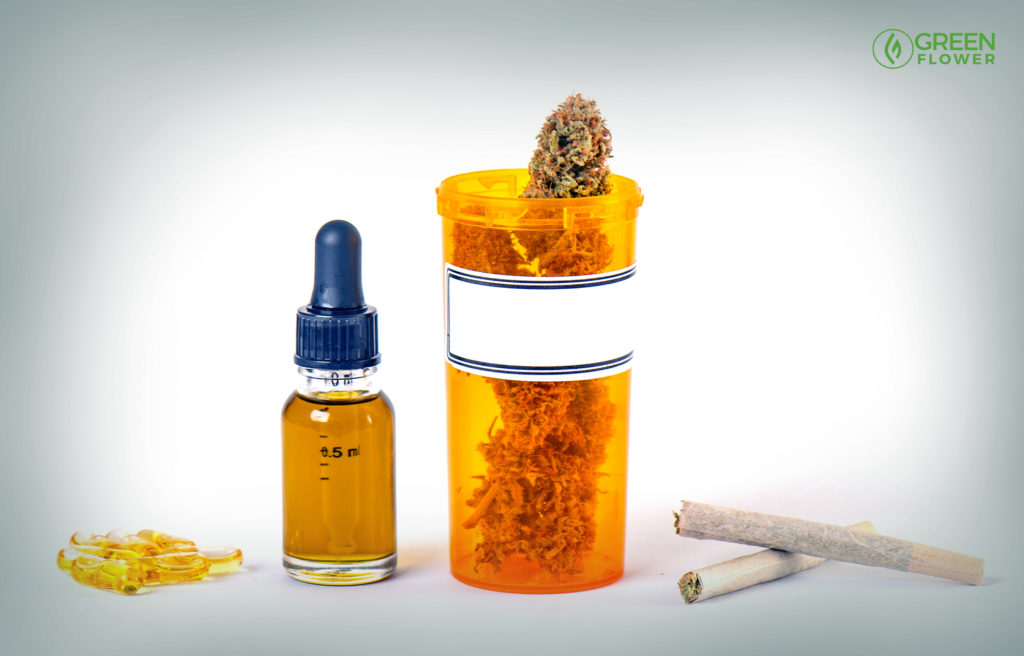The cannabis sativa plant is extremely intricate, containing hundreds of unique compounds. Arguably the most famous active ingredient in marijuana is the cannabinoid THC. Short for tetrahydrocannabinol, the THC chemical is associated with the psychoactive or “high” effects of cannabis. Check out the Green Flower guide to THC below to learn more about this fascinating molecule — and what it can do for you!
THC Is A Cannabinoid
At its very base, tetrahydrocannabinol is a cannabinoid (more specifically a phytocannabinoid), which are the active compounds within the cannabis most responsible for the plant’s effects. When ingested, THC binds to CB1 and CB2 cannabinoid receptors throughout the body. These receptors belong to the endocannabinoid system (ECS), which is responsible for helping to maintain balance within the body. In fact, mammals produce their own cannabinoids, such as anandamide, which is an enzyme associated with the famous “runner’s high.” Phytocannabinoids like THC come from plants (hence the “phyto”) but are simply referred to as cannabinoids by most.
The effects of THC may differ slightly from person to person (and of course from strain to strain), but they’re typically associated with feelings of euphoria, relaxation, creativity, and joy. Physically, there may be a reduction in eye pressure or pain (if any is present), or an increase in appetite.

How Is It Used?
Consuming THC is done both recreationally and to achieve potential medical benefits, depending on a person’s desired outcomes. It can be delivered to the bloodstream in a variety of ways (more on that below). Medical cannabis has been used to treat many ailments and illnesses, including:
- Cancer
- Chronic pain
- Neuropathy
- Wasting associated with HIV/AIDS
- Glaucoma
- Diabetes
- Crohn’s/colitis
- And much more
Despite anecdotal evidence showing the efficacy of THC on a variety of diseases and disorders, a lack of peer-reviewed research exists due to cannabis’ federal designation as a Schedule I narcotic. Future studies will shine more light on the true nature of the cannabinoid and may lead to new FDA-approved medications being developed.
Is THC Legal?
This is where things get a little hazy. Currently, THC remains illegal in the eyes of the United States government. However, it is legal for medical and/or recreational purposes in a large number of states. The best way to figure out what’s allowed where you live is to research your state’s cannabis laws. If you’re worried about issues at work, it’s always smart to review any and all human resources policies available at your place of employment. Some employers allow for medical marijuana use while others reserve the right to drug test under certain circumstances.

How Should I Take THC?
As previously mentioned, there are several options available when it comes to consumption. Availability varies depending on where you live, as some states do not permit certain products. Cannabinoid and terpene content also differs greatly from product to product, so be sure to read testing labels. Reviewing a menu or chatting with friendly and knowledgeable budtenders who can make recommendations is always advised.
Here are some of the most popular forms:
- Flower: A tried and true method, smoking or vaping cannabis bud is the quintessential way to consume THC. The cannabinoid is processed via the lungs, with onset occurring within moments of inhalation.
- Concentrates: Cannabis concentrates — commonly referred to as dabs — are extracts of the plant. Typically much stronger than the flower itself, concentrates have a high THC content may contain upwards of 90 percent, depending on the variety. They are vaporized like flower and processed through inhalation.
- Edibles: Available in everything from sugary sweets to sriracha sauce, THC edibles are a popular option due to their discrete nature. The chemical compounds enter the bloodstream via the liver, meaning onset can take 30-90 minutes depending on individual metabolism (pro tip: start low and go slow).
- Topicals: Lotions, salves, and balms containing a concentration of THC are great for folks wishing to soothe aching muscles and joints or remedy skin conditions. Topicals are applied directly to problem areas, offering immediate localized relief through the skin.
- Tinctures: Another type of extract, tinctures are perfect for people seeking fast relief but do not wish to smoke or vape. Drops are placed under the tongue, entering the body sublingually through the mucous membranes in the mouth, with onset occurring in as little as 10 minutes.
What About Other Cannabinoids?
There are more than 100 cannabinoids present in the cannabis plant, but THC and CBD (cannabidiol) are the most well-known. While THC offers the most psychoactive effects, other cannabinoids like THC-A (the precursor to THC) and THC-V may have some mood-altering results. “Lesser-known” cannabinoids such as CBG and CBN are also starting to pique consumer interest as they are showing promising results in the therapeutic realms.
What If I Take Too Much?
Overconsumption of THC can happen to anyone, even if your tolerance is significantly greater than the average consumer. Negative side effects of overconsumption may include nervousness, sweating, or stomach ache. If you think you took too much THC, there are a few things you can try. First, breathe deep and remember that “everything is going to be just fine!” Taking CBD may counteract any unpleasantness associated with THC effects. Going for a walk, eating a snack, and staying hydrated may also help.
Is THC Right For You?
Deciding to try THC is a decision that shouldn’t be taken lightly as it is a psychoactive chemical, but depending on your situation, it could be extremely beneficial. Make sure to do your homework and discuss your thoughts with a partner or trusted friend. If considering medical marijuana, consulting with your primary care physician is also advised. Remember that cannabis is still illegal at the federal level and consumption may have unintended consequences as a result. However, nationwide legalization is all but certain in the coming years, which would open the floodgates to research and an increase in the positive perceptions of the plant. Regardless, the choice to consume THC is a personal one that can be made confidently by each individual when the time is right for them.

